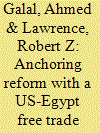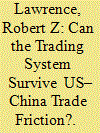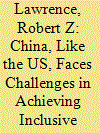| Srl | Item |
| 1 |
ID:
065337


|
|
|
|
|
| Publication |
Washington DC, Institute For International Economics, 2005.
|
| Description |
xi, 77p.
|
| Standard Number |
0881323683
|
|
|
|
|
|
|
|
|
|
|
|
Copies: C:1/I:0,R:0,Q:0
Circulation
| Accession# | Call# | Current Location | Status | Policy | Location |
| 050056 | 382.973062/GAL 050056 | Main | On Shelf | General | |
|
|
|
|
| 2 |
ID:
161579


|
|
|
|
|
| Summary/Abstract |
Donald Trump has sought to change US trading relationships by raising protection at home and taxing the offshore activities of US companies abroad. These measures, which both use and violate trade rules, have provoked retaliation from other countries. Such friction has restricted and distorted trade and investment, undermined the rules‐based trading system and perhaps permanently damaged global value chains that depend on stable rules for market access. Trump has justified some of his measures as a response to China's alleged unfair practices and indeed, China has adopted industrial and technology policies that are formally neutral between domestic and foreign firms but in practice have led foreign firms to complain about discriminatory practices that favor Chinese firms. The US friction with China is unfortunate because instead of trying to bully China into submission in a tariff war, the US could have dealt with many of its concerns more effectively by cooperating with other countries and taking actions that are consistent with maintaining the rules‐based system. While the US has undermined its leadership role, the overall damage to the trading system could still be limited if other countries, especially China, take actions that sustain and strengthen it.
|
|
|
|
|
|
|
|
|
|
|
|
|
|
|
|
| 3 |
ID:
171884


|
|
|
|
|
| Summary/Abstract |
For more than three decades the goal of becoming “the factory of the world” has been at the core of China’s development strategy. This strategy, in combination with high rates of domestic investment and low rates of consumption, has made Chinese production the most manufacturing intensive in the world. But as its wages have risen, China’s competitiveness in the most labor-intensive manufacturing industries has eroded. Its ability to assemble products remains a major source of its exports, but it has also tried to shift toward more sophisticated value-added production domestically. Chinese domestic spending has shifted away from investment toward consumption as citizens’ income has grown. Like Americans, Chinese are also spending more on services than on manufactured goods. All of these changes are fundamentally altering the structure of China’s production, reducing the role of manufacturing and increasing the skill levels of workers in manufacturing. This paper reviews the challenges posed by these developments for China’s long-term goal of achieving more inclusive growth. It presents evidence that the commonly held perceptions that Chinese manufacturing employment growth is robust are wrong. In fact, such growth has peaked and China is now following a pattern of structural change that is typical of a more mature emerging economy, in which the share of employment in manufacturing declines as workers are increasingly employed in services.
|
|
|
|
|
|
|
|
|
|
|
|
|
|
|
|